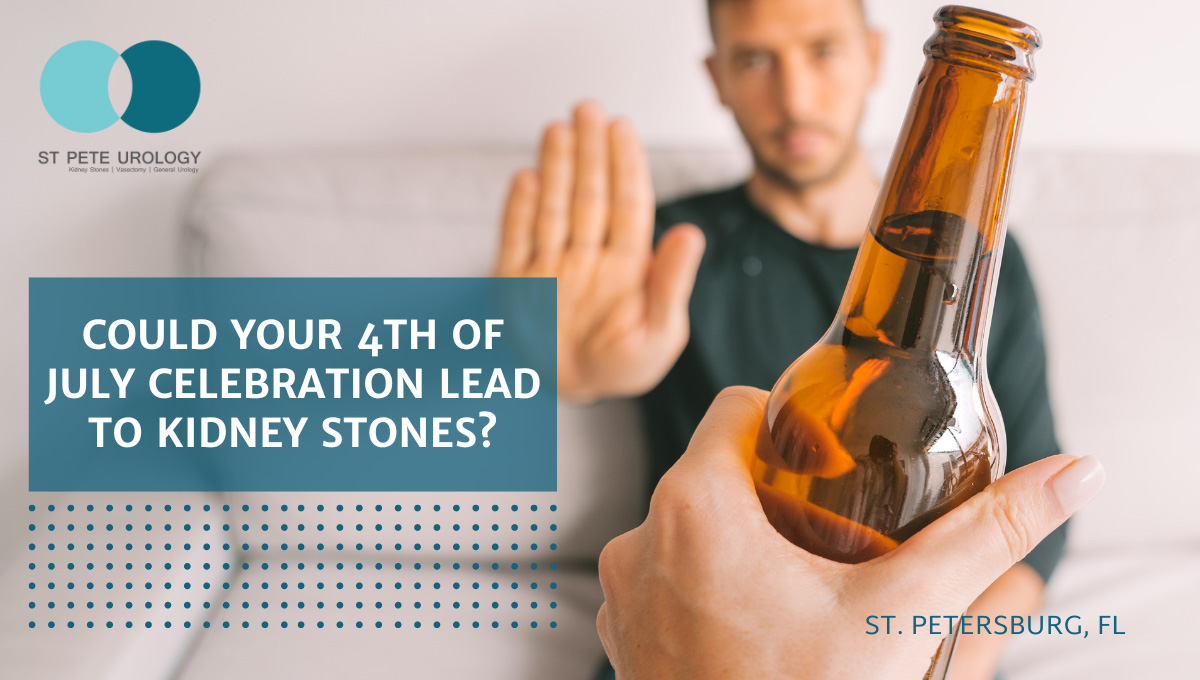Three Key Takeaways
- Consume foods that are lower in oxalates, such as lean proteins, fruits, and vegetables.
- Stay adequately hydrated during outdoor festivities to reduce the risk of kidney stone formation.
- Moderate alcohol intake to maintain a balance between celebrating and preserving kidney health.


What are kidney stones?
Kidney stones are hard deposits made up of minerals and salts that form inside your kidneys. They are often caused by increased concentration of certain substances in the urine which crystallize over time, forming these hard deposits. Genetics, certain medical conditions, and certain diets are among the risk factors that contribute to the development of kidney stones.
Link between diet and kidney stones
Your food and beverage intake during the 4th of July can have profound implications for your kidney health. Who could resist those succulent BBQ ribs or the homemade spinach pie? But did you know that such foods are high in oxalates, an organic compound that can increase the risk of stone formation when consumed excessively? The celebrations filled with delectable treats and heaping plates of food often push us to consume more of these oxalate-rich foodstuffs, potentially laying the foundation for kidney stones.
Dehydration and kidney stone risk
The summer heat is another antagonist to your kidney health, especially during the 4th of July festivities. Dehydration, a likely occurrence during outdoor activities in the mid-summer heat, can lead to concentrated urine. This heightened concentration of minerals in the urine can increase the likelihood of kidney stone formation. Hence, it’s crucial to stay adequately hydrated during these outdoor festivities.
Alcohol consumption and kidney stone formation
Consider the role of alcohol in this scenario. Alcohol, if consumed excessively, can lead to dehydration, further compounding the risk of kidney stones. While it may be integral to the celebration for some, moderation in alcohol intake can help maintain a balance, preserving kidney health while still partaking in the festivities.
Prevention and tips for a kidney-friendly 4th of July celebration
So how can you enjoy your 4th of July celebration without risking your kidney health? Opt for foods that are lower in oxalates, such as lean proteins like chicken breast or fish. Consume plenty of fruits and vegetables, and significantly up your water intake. These are simple yet effective strategies for kidney stone prevention. And remember – moderation is key when it comes to alcohol consumption.
Wrapping up, it may seem far-fetched to connect a joyous 4th of July celebration with something as grim as kidney stones. But the link is not as tenuous as you may think. The food and drinks that we rejoice in, the summer heat, and the alcohol that often accompanies our celebrations, all play a role in potentially increasing the risk of kidney stones. But with mindful dietary choices and adequate hydration, you can enjoy a healthy and safe holiday celebration.
If you’re in St. Petersburg, FL, and are looking for professional advice or treatment for kidney stones, reach out to St Pete Urology. Their team of experienced urologists is at your service to help maintain your kidney health and prevent kidney stones. Let your 4th of July celebration be filled with joyous memories, not marred by avoidable health risks.
References:
- “Hydration for kidney health – Kidney Research UK.” https://www.kidneyresearchuk.org/kidney-health-information/living-with-kidney-disease/how-can-i-help-myself/hydration-for-kidney-health/.
- “Drinking Alcohol Affects Your Kidneys.” https://www.kidney.org/news/kidneyCare/winter10/AlcoholAffects.
- “Kidney Stone Diet Plan and Prevention | National Kidney Foundation.” https://www.kidney.org/atoz/content/diet.




